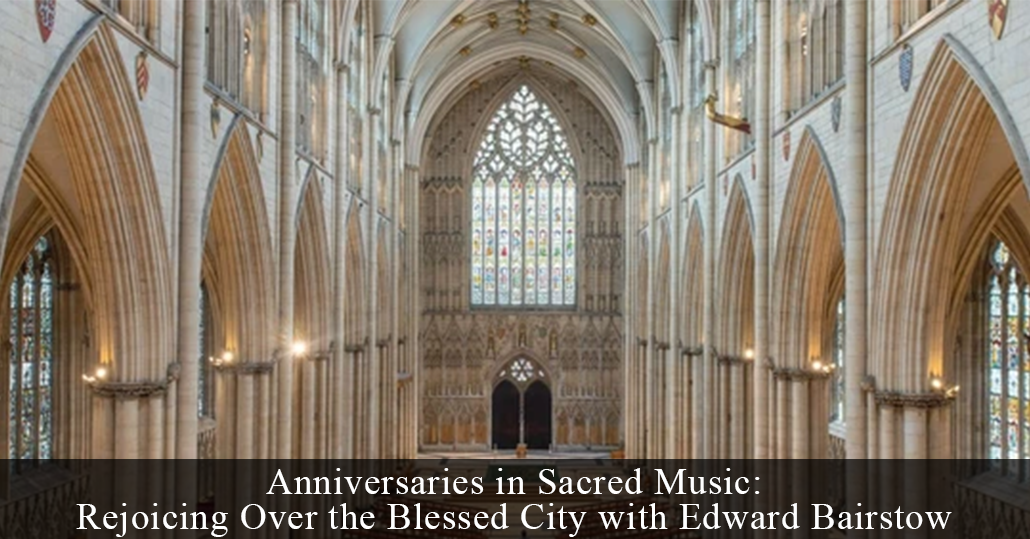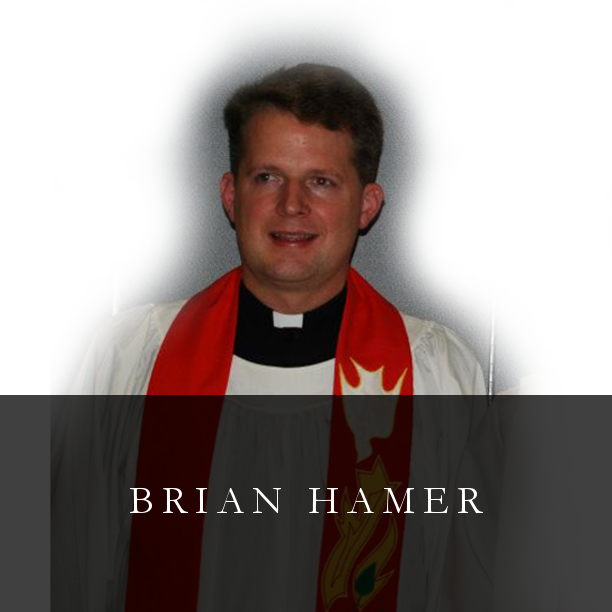-- 1 Samuel 2:8
Bairstow was an English organist, composer, and conductor. He was associated at various points in his life with the Royal College of Music, Chichester Cathedral (site of his burial), and perhaps above all with York Minster (see the image above), where he directed the music from 1913 until his death in 1946. Of his twenty-nine anthems for the church, he is perhaps best remembered for three works: “Save Us, O Lord” (1902), “Blessed City, Heavenly Salem” (1914), and “Let All Mortal Flesh Keep Silence” (1925). Writing in Grove Music Online, Francis Jackson says that these three works “are possessed of a deeply felt sentiment and enduring quality,” as our survey of “Blessed City” seeks to demonstrate. (Readers who wish to explore Bairstow’s music in greater detail are directed to Jackson’s book, Blessed City: The Life & Works of Sir Edward Barstow, 1874--1946 [Hyperion 1997]).
The text of “Blessed City, Heavenly Salem” (printed below the video link) is drawn from John Mason Neale’s translation of the ten-stanza Latin hymn, Urbs Beata Jerusalem, literally “Blessed City of Jerusalem.” Bairstow set stanzas 1–4 and 7 of the sixth-century chant, now conveniently available in Latin and English in Liber Hymnorum: The Latin Hymns of the Lutheran Church (Emmanuel Press 2016). Also drawn from the ten-stanza hymn is another five-stanza cento, the hymn “Christ Is Made the Sure Foundation” (Lutheran Service Book 909), which follows similar themes and is fittingly sung to the tune ‘Westminster Abbey’ by Henry Purcell, who served as church musician at Westminster. As the titular phrase implies, the ten-stanza text describes Christ as the foundation of the churchly Jerusalem and expounds on the gifts of salvation therein.
Scriptural foundations for the text include Ephesians 2:20–22, where we read that the church is “built on the foundation of the apostles and prophets, Christ Jesus himself being the chief cornerstone” (v. 20); Ephesians 4:15–16, where St. Paul admonishes the church to “grow up in every way into him who is the head, into Christ, from whom the whole body . . . makes the body grow so that it builds itself up in love”; St. John’s vision of “the holy city, new Jerusalem, coming down out of heaven from God” in Revelation 21:1–4; and not to be overlooked is the influence of Solomon’s prayer of dedication of the Temple, especially 2 Chronicles 6:18–21, most notably the petition for God to “have regard to the prayer of your servant and to his plea . . . listening to the city and to the prayer that your servant prays before you” (v. 19, emphasis added). It is no surprise that “Blessed City” is often sung for church dedications and anniversaries.
As one who spent more time in England’s mighty cathedrals than perhaps any other contemporary, Bairstow was certainly a perfect match to set this thoroughly ecclesiastical text to music. It begins with an organ flourish, fitting for the “angel hands apparelled” in stanza 1, accompanied by unison proclamations that the singers and the hearers are in the city of God. The boy sopranos carry the weight of stanza 2, as is fitting for phrases such as “new and ready,” “fair adorned,” and “of pure gold.” The gentlemen of the choir take the lead in stanza 3, as if an English garrison of choral vicars is opening the gates of heaven for the faithful. The most dramatic change is probably for stanza 4 to paint the texts “blow and biting sculpture” and “stones elect / In their places compacted” on a vivid musical canvas. Following a brief organ interlude, a treble soloist paints a serene picture of Solomon’s prayer for the Lord to “hear Thy servants as they pray.”
As you listen to “Blessed City,” musically you might agree with William McVicker’s assessment that it is “a curious and fascinating mix of Brahmsian harmony with plainsong, Elizabethan and Jacobean musical influences” (liner notes to Hyperion CDA66374, p. 7). Theologically, consider significance of the contrast between the opening flourish and the serene ending. Why is it fitting to bring this generally grandiose work to a peaceful close?
- Blessed city, heavenly Salem,
Vision dear of peace and love,
Who of living stones art builded
In the height of heaven above,
And by Angel hands apparelled,
As a bride doth earthward move; - Out of heaven from God descending,
New and ready to be wed
To thy Lord, whose love espoused thee,
Fair adorned shalt thou be led;
All thy gates and all thy bulwarks
Of pure gold are fashioned. - Bright thy gates of pearl are shining;
They are open evermore;
And their well-earned rest attaining
Thither faithful souls do soar,
Who for Christ's dear Name in this world
Pain and tribulation bore. - Many a blow and biting sculpture
Polished well those stones elect,
In their places now compacted
By the heavenly Architect,
Nevermore to leave the Temple
Which with them the Lord hath decked. - To this Temple, where we call Thee,
Come, O Lord of hosts, today;
With Thy wonted loving kindness,
Hear Thy servants as they pray;
And Thy fullest benediction
Shed within its walls alway.
| | The Lord makes poor and makes rich; he brings low and he exalts He raises up the poor from the dust; He lifts the needy from the ash heep to make them sit with princes and inherit a seat of honor For the pillars of the earth are the Lord’s, and on them he has set the world. – 1 Samuel 2:7–8 |
And perhaps this ongoing benediction or blessing is what the composer had in mind when he designed an ending of solitude and contentment? God’s Bride is at home in the new Jerusalem, for she leads an earthly life in heaven and a heavenly life on earth. In either case, God surrounds her with songs of deliverance and graciously bestows all the gifts of the gospel.
| | Grant, we pray, to all Your faithful All the gifts they ask to gain; What they gain from You, forever With the blessed to retain; And hereafter in Your glory Evermore with You to reign. – Lutheran Service Book 909.3 |



 RSS Feed
RSS Feed
